Contemporary Society: Analyzing Social Media's Impact on Teen Health
VerifiedAdded on 2023/06/12
|9
|2488
|143
Essay
AI Summary
This essay analyzes the impact of social media on the mental health of teenagers in contemporary society. It includes a documentary analysis of articles discussing the effects of social media on anxiety, depression, and overall well-being among teenagers. The discussion highlights both the positiv...
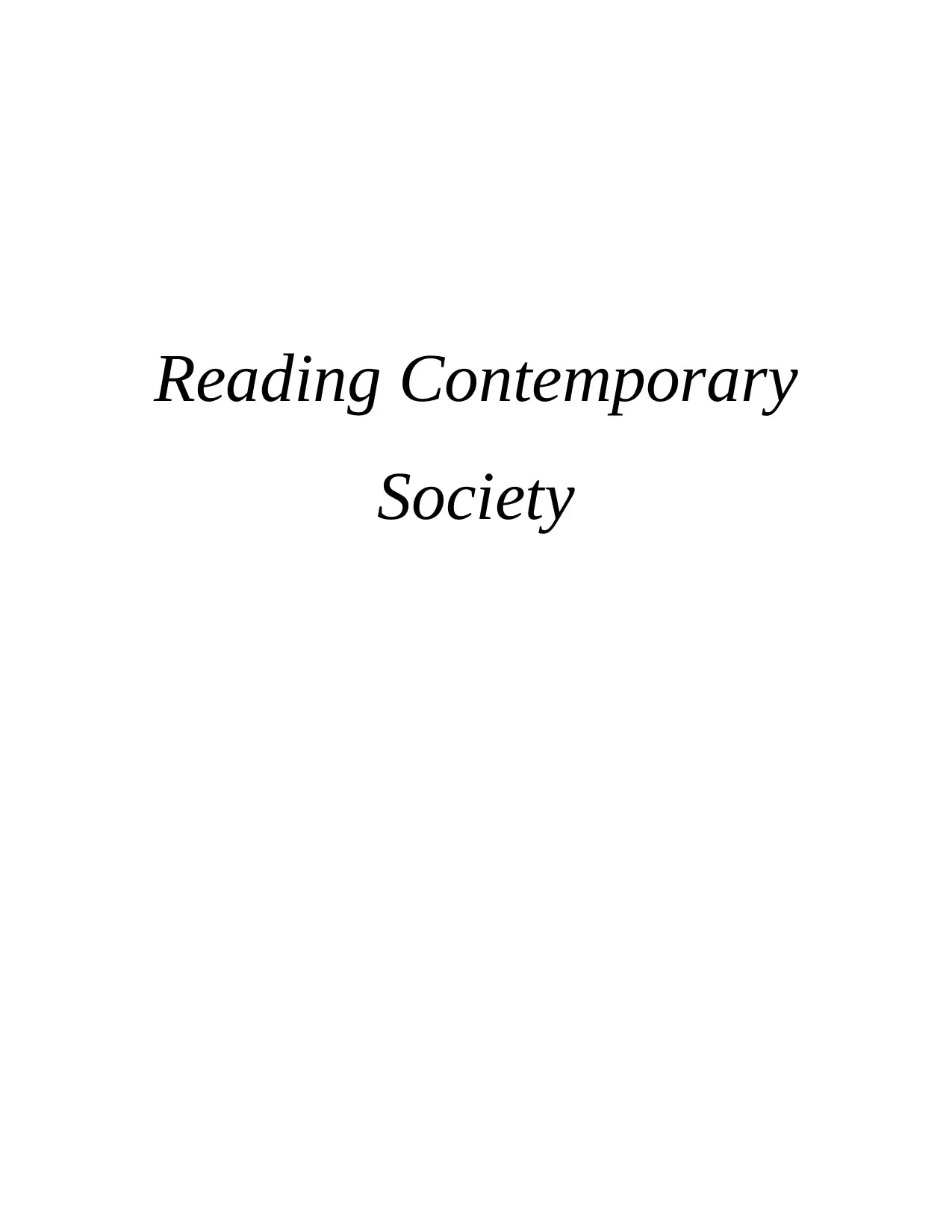
Reading Contemporary
Society
Society
Paraphrase This Document
Need a fresh take? Get an instant paraphrase of this document with our AI Paraphraser
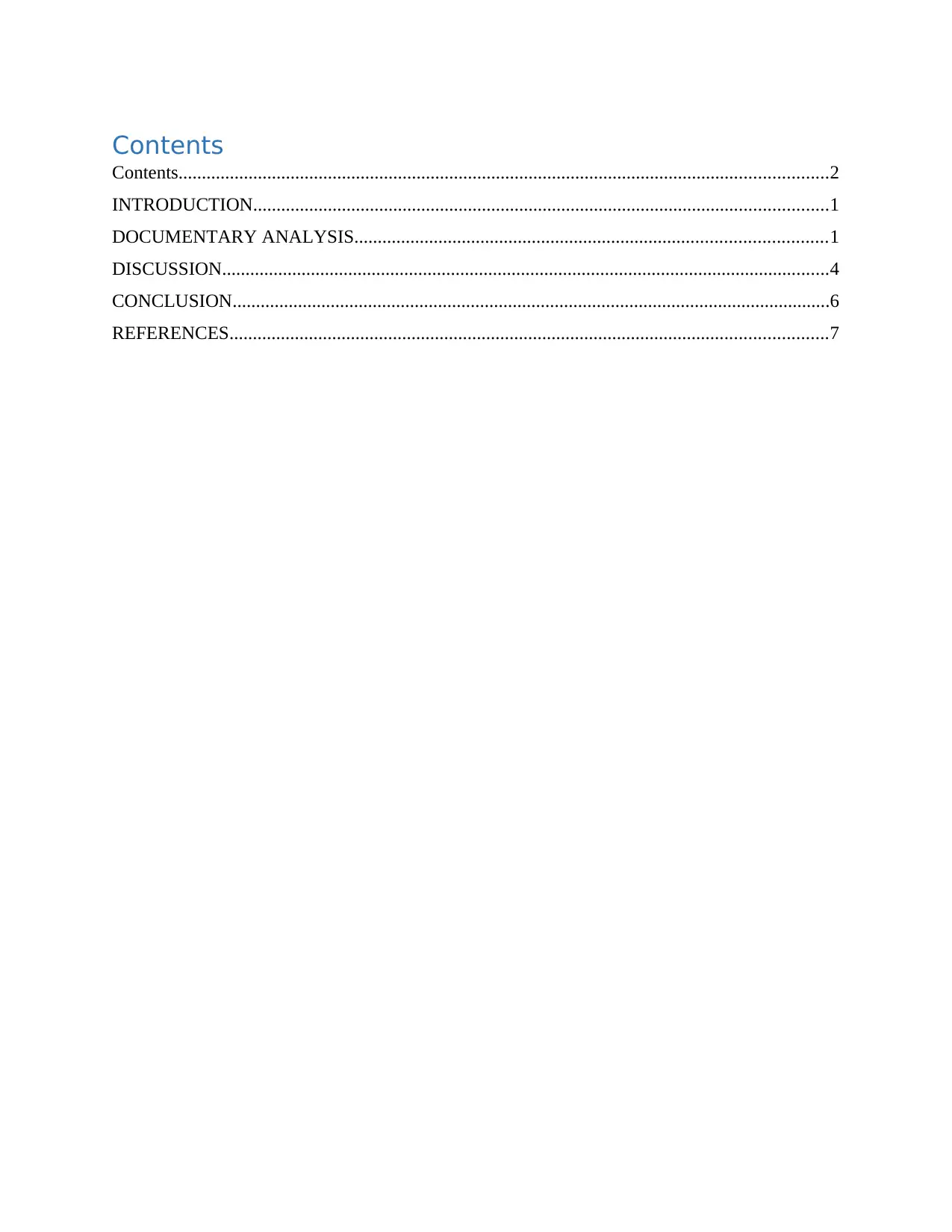
Contents
Contents...........................................................................................................................................2
INTRODUCTION...........................................................................................................................1
DOCUMENTARY ANALYSIS.....................................................................................................1
DISCUSSION..................................................................................................................................4
CONCLUSION................................................................................................................................6
REFERENCES................................................................................................................................7
Contents...........................................................................................................................................2
INTRODUCTION...........................................................................................................................1
DOCUMENTARY ANALYSIS.....................................................................................................1
DISCUSSION..................................................................................................................................4
CONCLUSION................................................................................................................................6
REFERENCES................................................................................................................................7
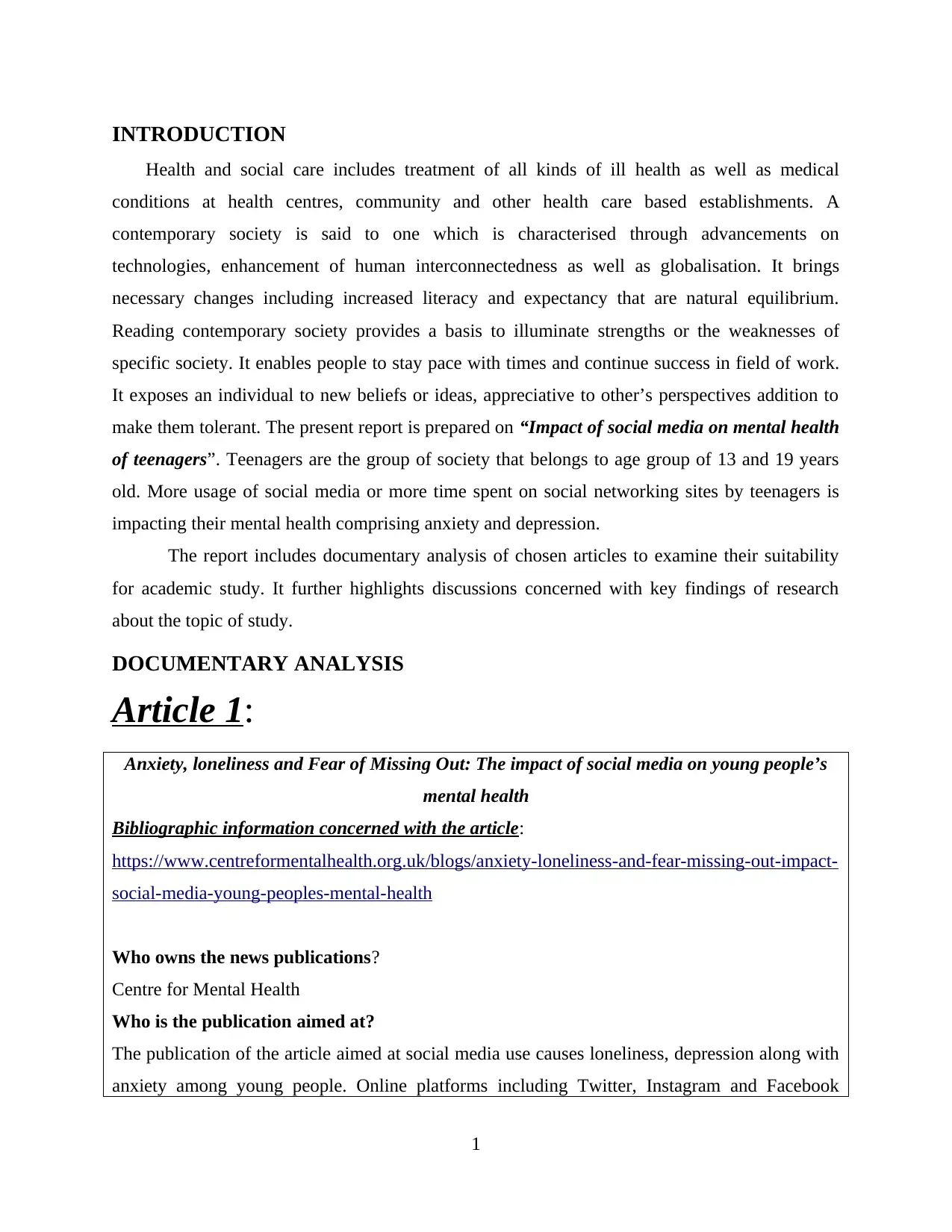
INTRODUCTION
Health and social care includes treatment of all kinds of ill health as well as medical
conditions at health centres, community and other health care based establishments. A
contemporary society is said to one which is characterised through advancements on
technologies, enhancement of human interconnectedness as well as globalisation. It brings
necessary changes including increased literacy and expectancy that are natural equilibrium.
Reading contemporary society provides a basis to illuminate strengths or the weaknesses of
specific society. It enables people to stay pace with times and continue success in field of work.
It exposes an individual to new beliefs or ideas, appreciative to other’s perspectives addition to
make them tolerant. The present report is prepared on “Impact of social media on mental health
of teenagers”. Teenagers are the group of society that belongs to age group of 13 and 19 years
old. More usage of social media or more time spent on social networking sites by teenagers is
impacting their mental health comprising anxiety and depression.
The report includes documentary analysis of chosen articles to examine their suitability
for academic study. It further highlights discussions concerned with key findings of research
about the topic of study.
DOCUMENTARY ANALYSIS
Article 1:
Anxiety, loneliness and Fear of Missing Out: The impact of social media on young people’s
mental health
Bibliographic information concerned with the article:
https://www.centreformentalhealth.org.uk/blogs/anxiety-loneliness-and-fear-missing-out-impact-
social-media-young-peoples-mental-health
Who owns the news publications?
Centre for Mental Health
Who is the publication aimed at?
The publication of the article aimed at social media use causes loneliness, depression along with
anxiety among young people. Online platforms including Twitter, Instagram and Facebook
1
Health and social care includes treatment of all kinds of ill health as well as medical
conditions at health centres, community and other health care based establishments. A
contemporary society is said to one which is characterised through advancements on
technologies, enhancement of human interconnectedness as well as globalisation. It brings
necessary changes including increased literacy and expectancy that are natural equilibrium.
Reading contemporary society provides a basis to illuminate strengths or the weaknesses of
specific society. It enables people to stay pace with times and continue success in field of work.
It exposes an individual to new beliefs or ideas, appreciative to other’s perspectives addition to
make them tolerant. The present report is prepared on “Impact of social media on mental health
of teenagers”. Teenagers are the group of society that belongs to age group of 13 and 19 years
old. More usage of social media or more time spent on social networking sites by teenagers is
impacting their mental health comprising anxiety and depression.
The report includes documentary analysis of chosen articles to examine their suitability
for academic study. It further highlights discussions concerned with key findings of research
about the topic of study.
DOCUMENTARY ANALYSIS
Article 1:
Anxiety, loneliness and Fear of Missing Out: The impact of social media on young people’s
mental health
Bibliographic information concerned with the article:
https://www.centreformentalhealth.org.uk/blogs/anxiety-loneliness-and-fear-missing-out-impact-
social-media-young-peoples-mental-health
Who owns the news publications?
Centre for Mental Health
Who is the publication aimed at?
The publication of the article aimed at social media use causes loneliness, depression along with
anxiety among young people. Online platforms including Twitter, Instagram and Facebook
1
⊘ This is a preview!⊘
Do you want full access?
Subscribe today to unlock all pages.

Trusted by 1+ million students worldwide
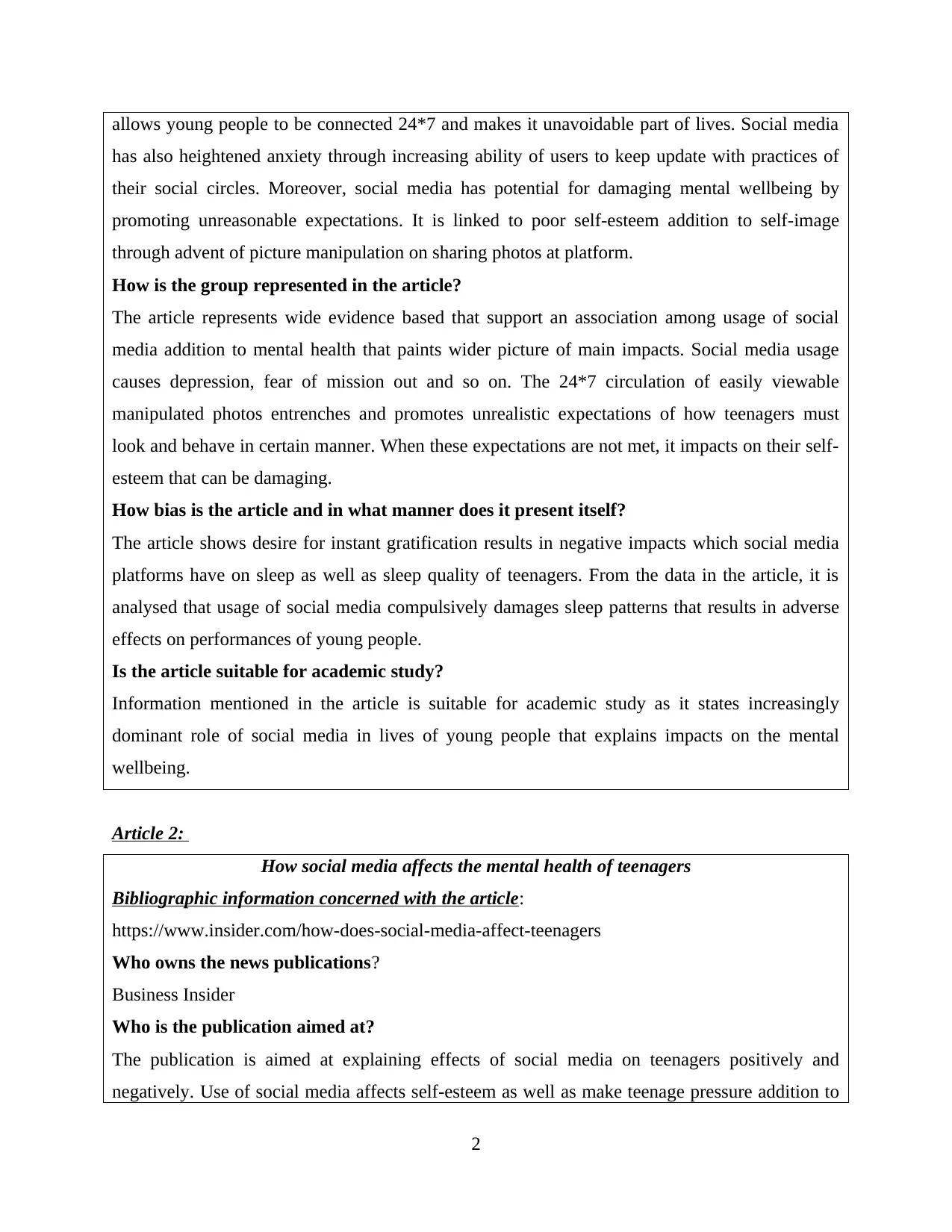
allows young people to be connected 24*7 and makes it unavoidable part of lives. Social media
has also heightened anxiety through increasing ability of users to keep update with practices of
their social circles. Moreover, social media has potential for damaging mental wellbeing by
promoting unreasonable expectations. It is linked to poor self-esteem addition to self-image
through advent of picture manipulation on sharing photos at platform.
How is the group represented in the article?
The article represents wide evidence based that support an association among usage of social
media addition to mental health that paints wider picture of main impacts. Social media usage
causes depression, fear of mission out and so on. The 24*7 circulation of easily viewable
manipulated photos entrenches and promotes unrealistic expectations of how teenagers must
look and behave in certain manner. When these expectations are not met, it impacts on their self-
esteem that can be damaging.
How bias is the article and in what manner does it present itself?
The article shows desire for instant gratification results in negative impacts which social media
platforms have on sleep as well as sleep quality of teenagers. From the data in the article, it is
analysed that usage of social media compulsively damages sleep patterns that results in adverse
effects on performances of young people.
Is the article suitable for academic study?
Information mentioned in the article is suitable for academic study as it states increasingly
dominant role of social media in lives of young people that explains impacts on the mental
wellbeing.
Article 2:
How social media affects the mental health of teenagers
Bibliographic information concerned with the article:
https://www.insider.com/how-does-social-media-affect-teenagers
Who owns the news publications?
Business Insider
Who is the publication aimed at?
The publication is aimed at explaining effects of social media on teenagers positively and
negatively. Use of social media affects self-esteem as well as make teenage pressure addition to
2
has also heightened anxiety through increasing ability of users to keep update with practices of
their social circles. Moreover, social media has potential for damaging mental wellbeing by
promoting unreasonable expectations. It is linked to poor self-esteem addition to self-image
through advent of picture manipulation on sharing photos at platform.
How is the group represented in the article?
The article represents wide evidence based that support an association among usage of social
media addition to mental health that paints wider picture of main impacts. Social media usage
causes depression, fear of mission out and so on. The 24*7 circulation of easily viewable
manipulated photos entrenches and promotes unrealistic expectations of how teenagers must
look and behave in certain manner. When these expectations are not met, it impacts on their self-
esteem that can be damaging.
How bias is the article and in what manner does it present itself?
The article shows desire for instant gratification results in negative impacts which social media
platforms have on sleep as well as sleep quality of teenagers. From the data in the article, it is
analysed that usage of social media compulsively damages sleep patterns that results in adverse
effects on performances of young people.
Is the article suitable for academic study?
Information mentioned in the article is suitable for academic study as it states increasingly
dominant role of social media in lives of young people that explains impacts on the mental
wellbeing.
Article 2:
How social media affects the mental health of teenagers
Bibliographic information concerned with the article:
https://www.insider.com/how-does-social-media-affect-teenagers
Who owns the news publications?
Business Insider
Who is the publication aimed at?
The publication is aimed at explaining effects of social media on teenagers positively and
negatively. Use of social media affects self-esteem as well as make teenage pressure addition to
2
Paraphrase This Document
Need a fresh take? Get an instant paraphrase of this document with our AI Paraphraser
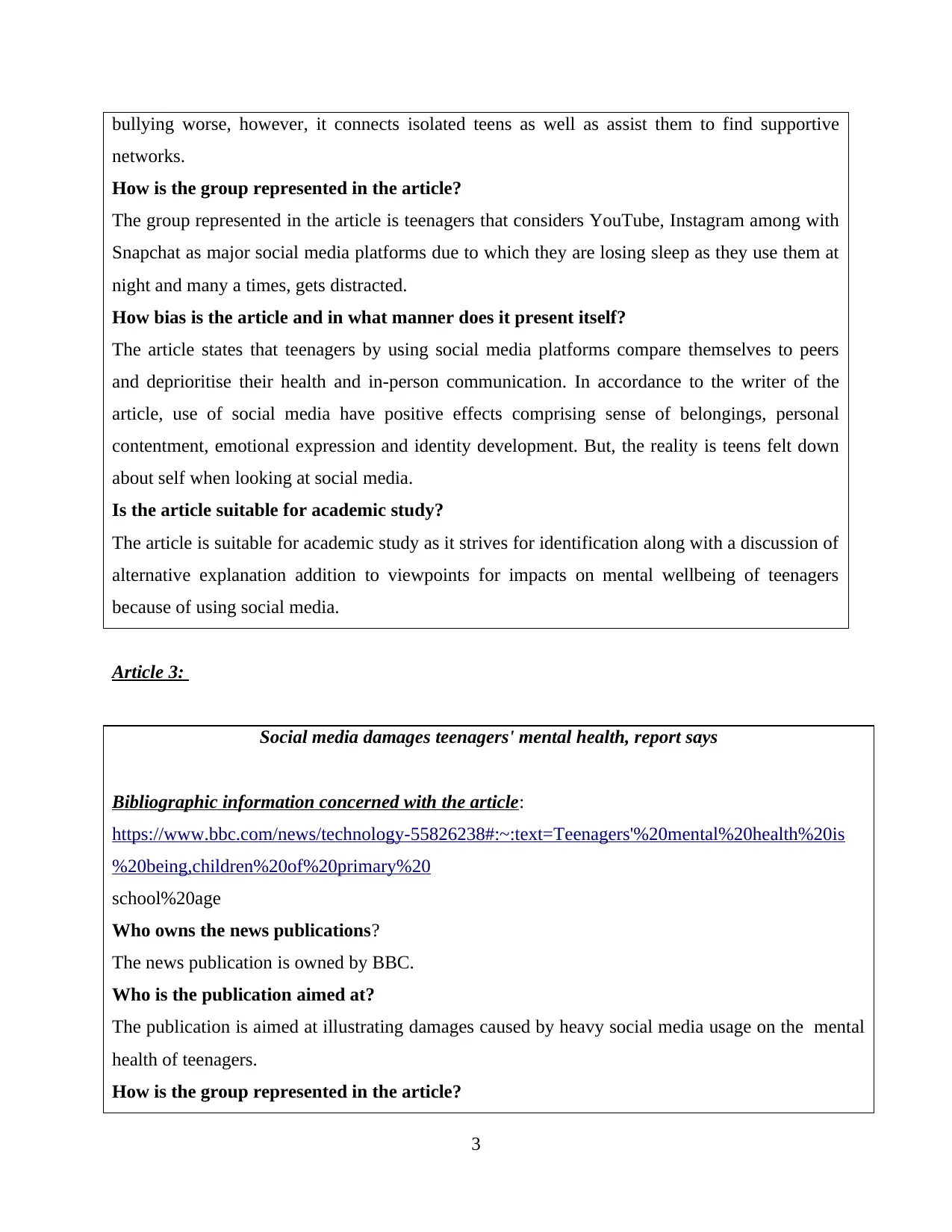
bullying worse, however, it connects isolated teens as well as assist them to find supportive
networks.
How is the group represented in the article?
The group represented in the article is teenagers that considers YouTube, Instagram among with
Snapchat as major social media platforms due to which they are losing sleep as they use them at
night and many a times, gets distracted.
How bias is the article and in what manner does it present itself?
The article states that teenagers by using social media platforms compare themselves to peers
and deprioritise their health and in-person communication. In accordance to the writer of the
article, use of social media have positive effects comprising sense of belongings, personal
contentment, emotional expression and identity development. But, the reality is teens felt down
about self when looking at social media.
Is the article suitable for academic study?
The article is suitable for academic study as it strives for identification along with a discussion of
alternative explanation addition to viewpoints for impacts on mental wellbeing of teenagers
because of using social media.
Article 3:
Social media damages teenagers' mental health, report says
Bibliographic information concerned with the article:
https://www.bbc.com/news/technology-55826238#:~:text=Teenagers'%20mental%20health%20is
%20being,children%20of%20primary%20
school%20age
Who owns the news publications?
The news publication is owned by BBC.
Who is the publication aimed at?
The publication is aimed at illustrating damages caused by heavy social media usage on the mental
health of teenagers.
How is the group represented in the article?
3
networks.
How is the group represented in the article?
The group represented in the article is teenagers that considers YouTube, Instagram among with
Snapchat as major social media platforms due to which they are losing sleep as they use them at
night and many a times, gets distracted.
How bias is the article and in what manner does it present itself?
The article states that teenagers by using social media platforms compare themselves to peers
and deprioritise their health and in-person communication. In accordance to the writer of the
article, use of social media have positive effects comprising sense of belongings, personal
contentment, emotional expression and identity development. But, the reality is teens felt down
about self when looking at social media.
Is the article suitable for academic study?
The article is suitable for academic study as it strives for identification along with a discussion of
alternative explanation addition to viewpoints for impacts on mental wellbeing of teenagers
because of using social media.
Article 3:
Social media damages teenagers' mental health, report says
Bibliographic information concerned with the article:
https://www.bbc.com/news/technology-55826238#:~:text=Teenagers'%20mental%20health%20is
%20being,children%20of%20primary%20
school%20age
Who owns the news publications?
The news publication is owned by BBC.
Who is the publication aimed at?
The publication is aimed at illustrating damages caused by heavy social media usage on the mental
health of teenagers.
How is the group represented in the article?
3
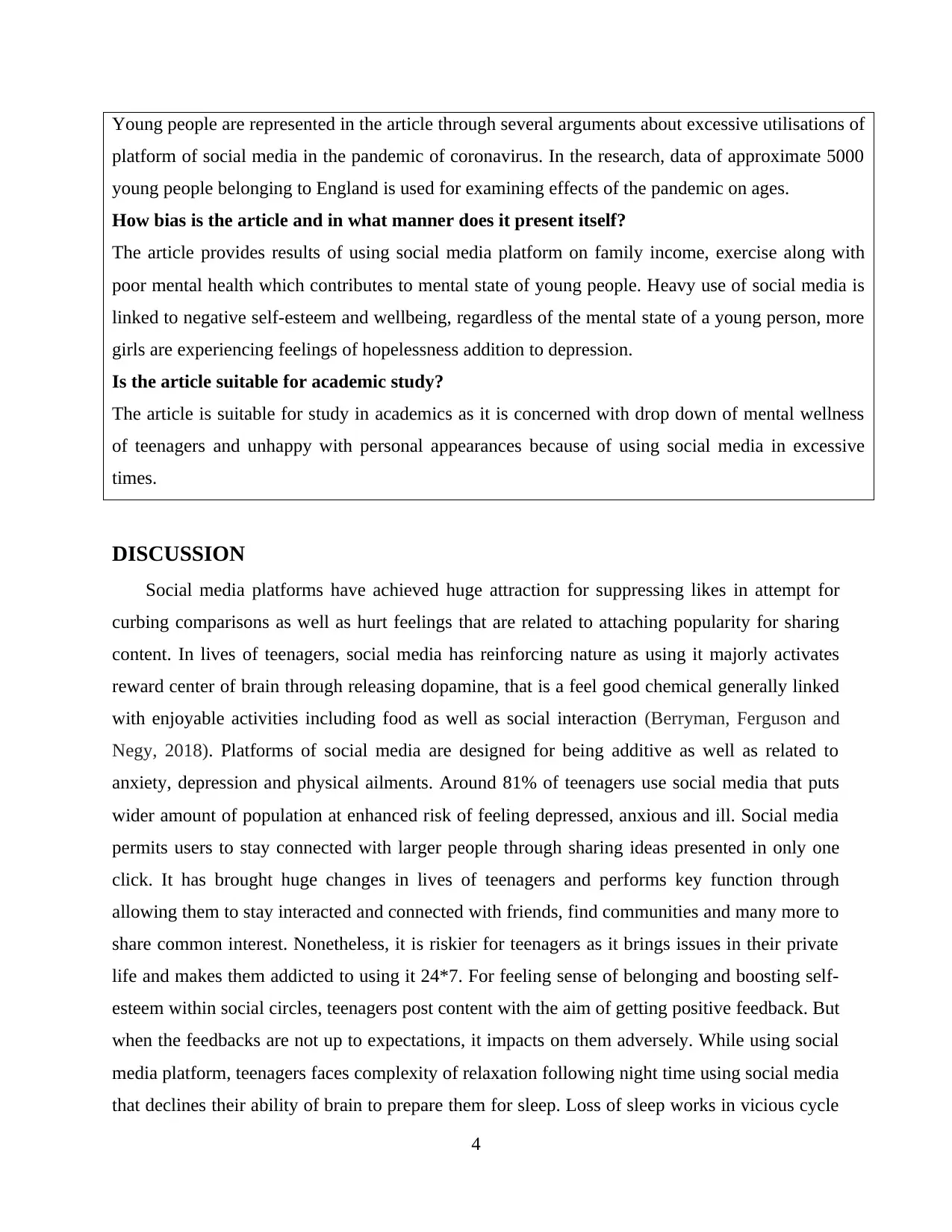
Young people are represented in the article through several arguments about excessive utilisations of
platform of social media in the pandemic of coronavirus. In the research, data of approximate 5000
young people belonging to England is used for examining effects of the pandemic on ages.
How bias is the article and in what manner does it present itself?
The article provides results of using social media platform on family income, exercise along with
poor mental health which contributes to mental state of young people. Heavy use of social media is
linked to negative self-esteem and wellbeing, regardless of the mental state of a young person, more
girls are experiencing feelings of hopelessness addition to depression.
Is the article suitable for academic study?
The article is suitable for study in academics as it is concerned with drop down of mental wellness
of teenagers and unhappy with personal appearances because of using social media in excessive
times.
DISCUSSION
Social media platforms have achieved huge attraction for suppressing likes in attempt for
curbing comparisons as well as hurt feelings that are related to attaching popularity for sharing
content. In lives of teenagers, social media has reinforcing nature as using it majorly activates
reward center of brain through releasing dopamine, that is a feel good chemical generally linked
with enjoyable activities including food as well as social interaction (Berryman, Ferguson and
Negy, 2018). Platforms of social media are designed for being additive as well as related to
anxiety, depression and physical ailments. Around 81% of teenagers use social media that puts
wider amount of population at enhanced risk of feeling depressed, anxious and ill. Social media
permits users to stay connected with larger people through sharing ideas presented in only one
click. It has brought huge changes in lives of teenagers and performs key function through
allowing them to stay interacted and connected with friends, find communities and many more to
share common interest. Nonetheless, it is riskier for teenagers as it brings issues in their private
life and makes them addicted to using it 24*7. For feeling sense of belonging and boosting self-
esteem within social circles, teenagers post content with the aim of getting positive feedback. But
when the feedbacks are not up to expectations, it impacts on them adversely. While using social
media platform, teenagers faces complexity of relaxation following night time using social media
that declines their ability of brain to prepare them for sleep. Loss of sleep works in vicious cycle
4
platform of social media in the pandemic of coronavirus. In the research, data of approximate 5000
young people belonging to England is used for examining effects of the pandemic on ages.
How bias is the article and in what manner does it present itself?
The article provides results of using social media platform on family income, exercise along with
poor mental health which contributes to mental state of young people. Heavy use of social media is
linked to negative self-esteem and wellbeing, regardless of the mental state of a young person, more
girls are experiencing feelings of hopelessness addition to depression.
Is the article suitable for academic study?
The article is suitable for study in academics as it is concerned with drop down of mental wellness
of teenagers and unhappy with personal appearances because of using social media in excessive
times.
DISCUSSION
Social media platforms have achieved huge attraction for suppressing likes in attempt for
curbing comparisons as well as hurt feelings that are related to attaching popularity for sharing
content. In lives of teenagers, social media has reinforcing nature as using it majorly activates
reward center of brain through releasing dopamine, that is a feel good chemical generally linked
with enjoyable activities including food as well as social interaction (Berryman, Ferguson and
Negy, 2018). Platforms of social media are designed for being additive as well as related to
anxiety, depression and physical ailments. Around 81% of teenagers use social media that puts
wider amount of population at enhanced risk of feeling depressed, anxious and ill. Social media
permits users to stay connected with larger people through sharing ideas presented in only one
click. It has brought huge changes in lives of teenagers and performs key function through
allowing them to stay interacted and connected with friends, find communities and many more to
share common interest. Nonetheless, it is riskier for teenagers as it brings issues in their private
life and makes them addicted to using it 24*7. For feeling sense of belonging and boosting self-
esteem within social circles, teenagers post content with the aim of getting positive feedback. But
when the feedbacks are not up to expectations, it impacts on them adversely. While using social
media platform, teenagers faces complexity of relaxation following night time using social media
that declines their ability of brain to prepare them for sleep. Loss of sleep works in vicious cycle
4
⊘ This is a preview!⊘
Do you want full access?
Subscribe today to unlock all pages.

Trusted by 1+ million students worldwide
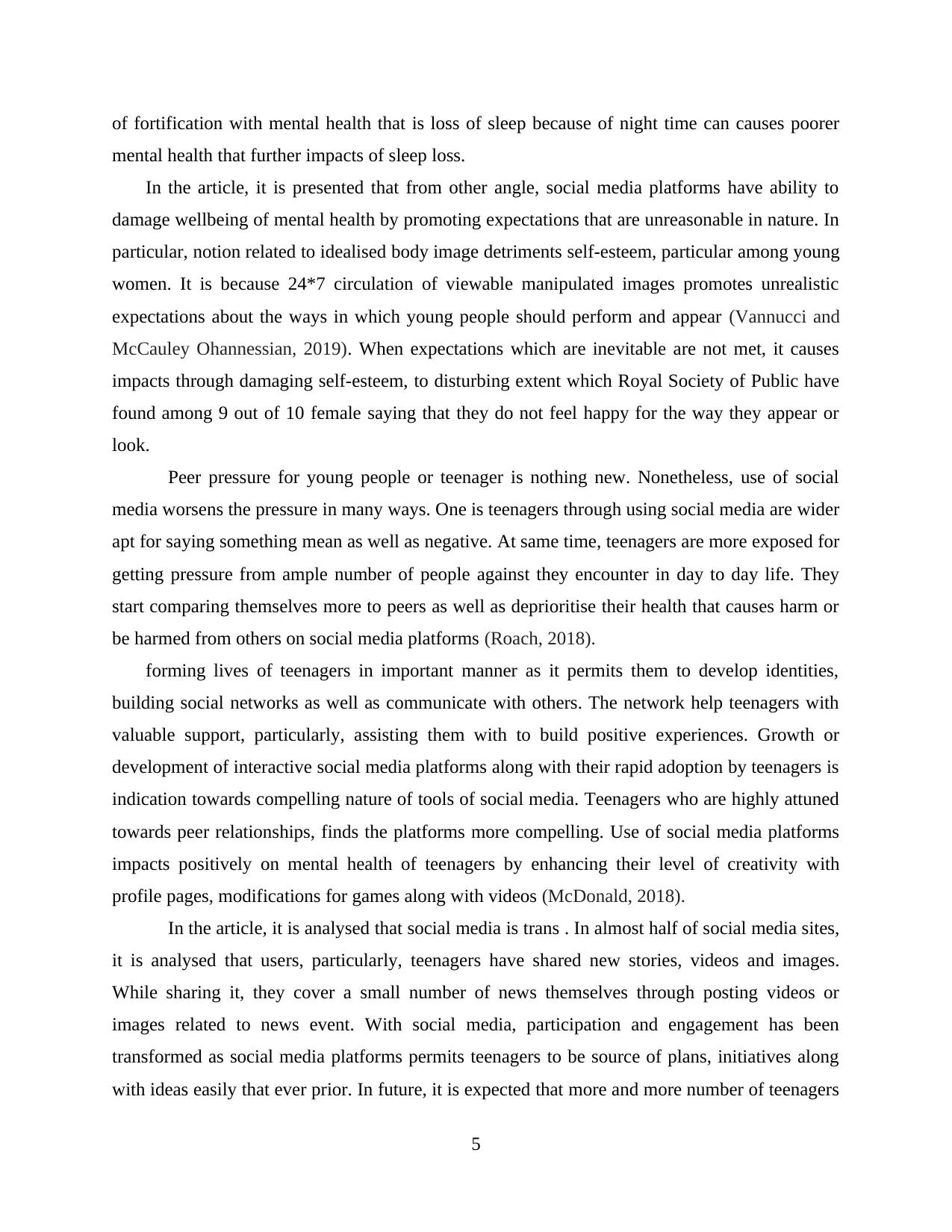
of fortification with mental health that is loss of sleep because of night time can causes poorer
mental health that further impacts of sleep loss.
In the article, it is presented that from other angle, social media platforms have ability to
damage wellbeing of mental health by promoting expectations that are unreasonable in nature. In
particular, notion related to idealised body image detriments self-esteem, particular among young
women. It is because 24*7 circulation of viewable manipulated images promotes unrealistic
expectations about the ways in which young people should perform and appear (Vannucci and
McCauley Ohannessian, 2019). When expectations which are inevitable are not met, it causes
impacts through damaging self-esteem, to disturbing extent which Royal Society of Public have
found among 9 out of 10 female saying that they do not feel happy for the way they appear or
look.
Peer pressure for young people or teenager is nothing new. Nonetheless, use of social
media worsens the pressure in many ways. One is teenagers through using social media are wider
apt for saying something mean as well as negative. At same time, teenagers are more exposed for
getting pressure from ample number of people against they encounter in day to day life. They
start comparing themselves more to peers as well as deprioritise their health that causes harm or
be harmed from others on social media platforms (Roach, 2018).
forming lives of teenagers in important manner as it permits them to develop identities,
building social networks as well as communicate with others. The network help teenagers with
valuable support, particularly, assisting them with to build positive experiences. Growth or
development of interactive social media platforms along with their rapid adoption by teenagers is
indication towards compelling nature of tools of social media. Teenagers who are highly attuned
towards peer relationships, finds the platforms more compelling. Use of social media platforms
impacts positively on mental health of teenagers by enhancing their level of creativity with
profile pages, modifications for games along with videos (McDonald, 2018).
In the article, it is analysed that social media is trans . In almost half of social media sites,
it is analysed that users, particularly, teenagers have shared new stories, videos and images.
While sharing it, they cover a small number of news themselves through posting videos or
images related to news event. With social media, participation and engagement has been
transformed as social media platforms permits teenagers to be source of plans, initiatives along
with ideas easily that ever prior. In future, it is expected that more and more number of teenagers
5
mental health that further impacts of sleep loss.
In the article, it is presented that from other angle, social media platforms have ability to
damage wellbeing of mental health by promoting expectations that are unreasonable in nature. In
particular, notion related to idealised body image detriments self-esteem, particular among young
women. It is because 24*7 circulation of viewable manipulated images promotes unrealistic
expectations about the ways in which young people should perform and appear (Vannucci and
McCauley Ohannessian, 2019). When expectations which are inevitable are not met, it causes
impacts through damaging self-esteem, to disturbing extent which Royal Society of Public have
found among 9 out of 10 female saying that they do not feel happy for the way they appear or
look.
Peer pressure for young people or teenager is nothing new. Nonetheless, use of social
media worsens the pressure in many ways. One is teenagers through using social media are wider
apt for saying something mean as well as negative. At same time, teenagers are more exposed for
getting pressure from ample number of people against they encounter in day to day life. They
start comparing themselves more to peers as well as deprioritise their health that causes harm or
be harmed from others on social media platforms (Roach, 2018).
forming lives of teenagers in important manner as it permits them to develop identities,
building social networks as well as communicate with others. The network help teenagers with
valuable support, particularly, assisting them with to build positive experiences. Growth or
development of interactive social media platforms along with their rapid adoption by teenagers is
indication towards compelling nature of tools of social media. Teenagers who are highly attuned
towards peer relationships, finds the platforms more compelling. Use of social media platforms
impacts positively on mental health of teenagers by enhancing their level of creativity with
profile pages, modifications for games along with videos (McDonald, 2018).
In the article, it is analysed that social media is trans . In almost half of social media sites,
it is analysed that users, particularly, teenagers have shared new stories, videos and images.
While sharing it, they cover a small number of news themselves through posting videos or
images related to news event. With social media, participation and engagement has been
transformed as social media platforms permits teenagers to be source of plans, initiatives along
with ideas easily that ever prior. In future, it is expected that more and more number of teenagers
5
Paraphrase This Document
Need a fresh take? Get an instant paraphrase of this document with our AI Paraphraser
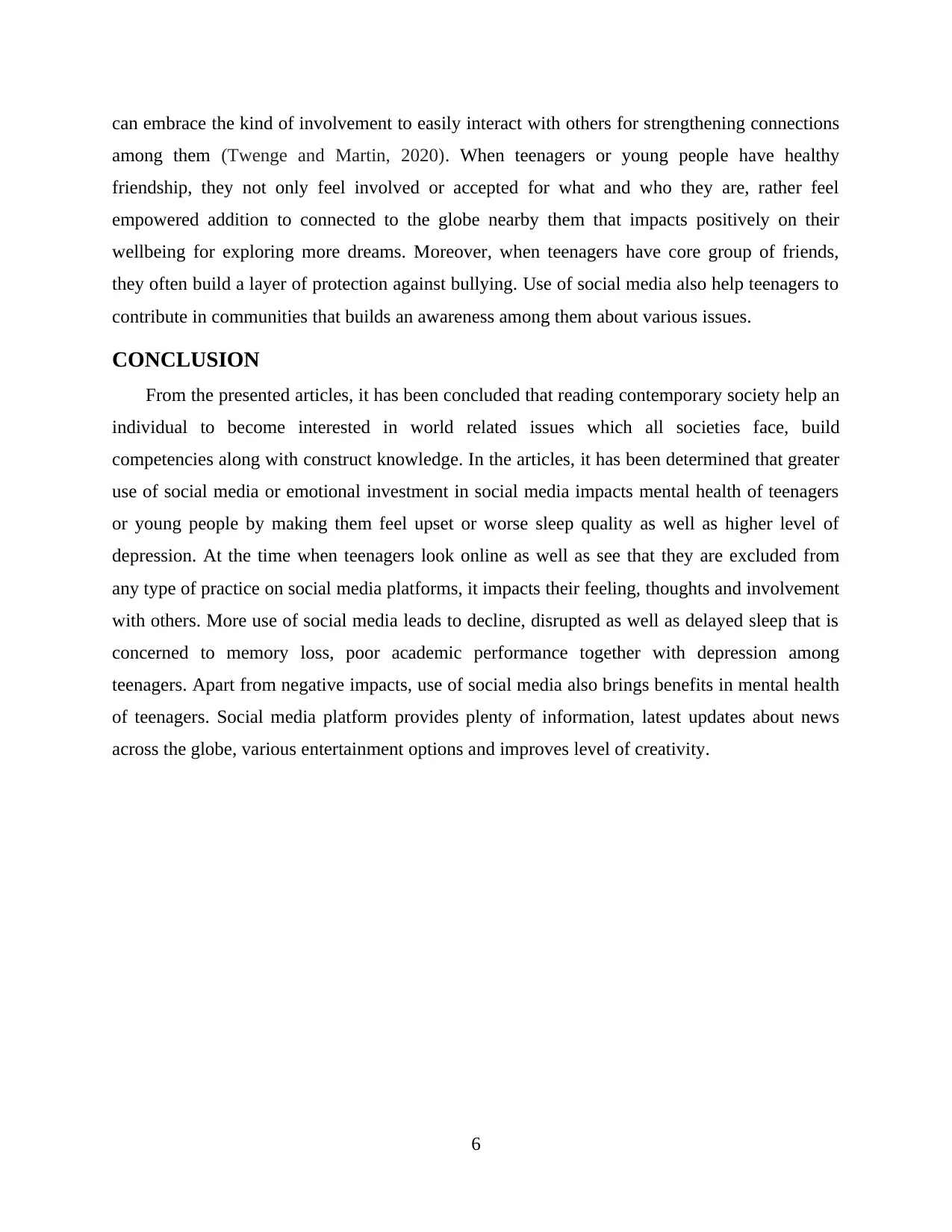
can embrace the kind of involvement to easily interact with others for strengthening connections
among them (Twenge and Martin, 2020). When teenagers or young people have healthy
friendship, they not only feel involved or accepted for what and who they are, rather feel
empowered addition to connected to the globe nearby them that impacts positively on their
wellbeing for exploring more dreams. Moreover, when teenagers have core group of friends,
they often build a layer of protection against bullying. Use of social media also help teenagers to
contribute in communities that builds an awareness among them about various issues.
CONCLUSION
From the presented articles, it has been concluded that reading contemporary society help an
individual to become interested in world related issues which all societies face, build
competencies along with construct knowledge. In the articles, it has been determined that greater
use of social media or emotional investment in social media impacts mental health of teenagers
or young people by making them feel upset or worse sleep quality as well as higher level of
depression. At the time when teenagers look online as well as see that they are excluded from
any type of practice on social media platforms, it impacts their feeling, thoughts and involvement
with others. More use of social media leads to decline, disrupted as well as delayed sleep that is
concerned to memory loss, poor academic performance together with depression among
teenagers. Apart from negative impacts, use of social media also brings benefits in mental health
of teenagers. Social media platform provides plenty of information, latest updates about news
across the globe, various entertainment options and improves level of creativity.
6
among them (Twenge and Martin, 2020). When teenagers or young people have healthy
friendship, they not only feel involved or accepted for what and who they are, rather feel
empowered addition to connected to the globe nearby them that impacts positively on their
wellbeing for exploring more dreams. Moreover, when teenagers have core group of friends,
they often build a layer of protection against bullying. Use of social media also help teenagers to
contribute in communities that builds an awareness among them about various issues.
CONCLUSION
From the presented articles, it has been concluded that reading contemporary society help an
individual to become interested in world related issues which all societies face, build
competencies along with construct knowledge. In the articles, it has been determined that greater
use of social media or emotional investment in social media impacts mental health of teenagers
or young people by making them feel upset or worse sleep quality as well as higher level of
depression. At the time when teenagers look online as well as see that they are excluded from
any type of practice on social media platforms, it impacts their feeling, thoughts and involvement
with others. More use of social media leads to decline, disrupted as well as delayed sleep that is
concerned to memory loss, poor academic performance together with depression among
teenagers. Apart from negative impacts, use of social media also brings benefits in mental health
of teenagers. Social media platform provides plenty of information, latest updates about news
across the globe, various entertainment options and improves level of creativity.
6
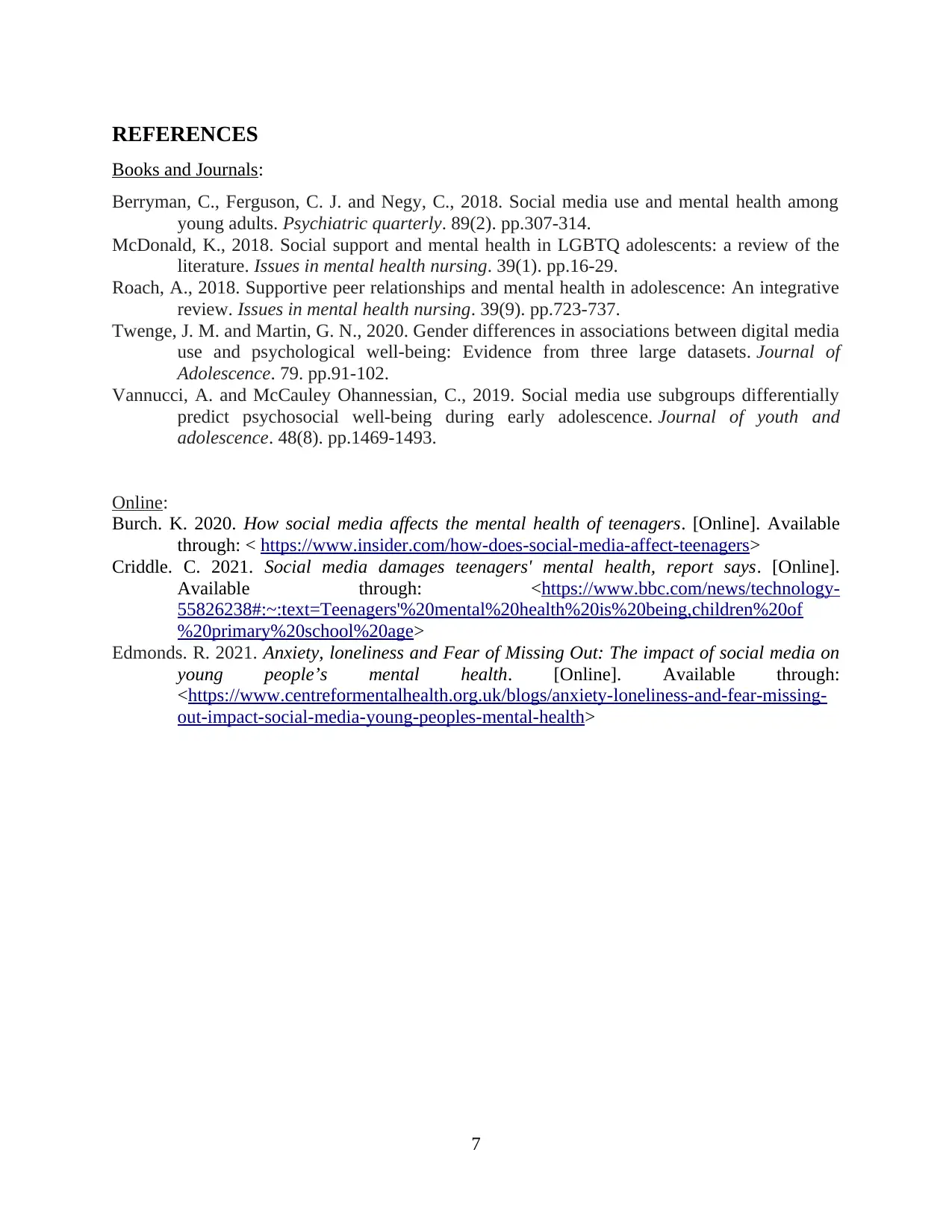
REFERENCES
Books and Journals:
Berryman, C., Ferguson, C. J. and Negy, C., 2018. Social media use and mental health among
young adults. Psychiatric quarterly. 89(2). pp.307-314.
McDonald, K., 2018. Social support and mental health in LGBTQ adolescents: a review of the
literature. Issues in mental health nursing. 39(1). pp.16-29.
Roach, A., 2018. Supportive peer relationships and mental health in adolescence: An integrative
review. Issues in mental health nursing. 39(9). pp.723-737.
Twenge, J. M. and Martin, G. N., 2020. Gender differences in associations between digital media
use and psychological well-being: Evidence from three large datasets. Journal of
Adolescence. 79. pp.91-102.
Vannucci, A. and McCauley Ohannessian, C., 2019. Social media use subgroups differentially
predict psychosocial well-being during early adolescence. Journal of youth and
adolescence. 48(8). pp.1469-1493.
Online:
Burch. K. 2020. How social media affects the mental health of teenagers. [Online]. Available
through: < https://www.insider.com/how-does-social-media-affect-teenagers>
Criddle. C. 2021. Social media damages teenagers' mental health, report says. [Online].
Available through: <https://www.bbc.com/news/technology-
55826238#:~:text=Teenagers'%20mental%20health%20is%20being,children%20of
%20primary%20school%20age>
Edmonds. R. 2021. Anxiety, loneliness and Fear of Missing Out: The impact of social media on
young people’s mental health. [Online]. Available through:
<https://www.centreformentalhealth.org.uk/blogs/anxiety-loneliness-and-fear-missing-
out-impact-social-media-young-peoples-mental-health>
7
Books and Journals:
Berryman, C., Ferguson, C. J. and Negy, C., 2018. Social media use and mental health among
young adults. Psychiatric quarterly. 89(2). pp.307-314.
McDonald, K., 2018. Social support and mental health in LGBTQ adolescents: a review of the
literature. Issues in mental health nursing. 39(1). pp.16-29.
Roach, A., 2018. Supportive peer relationships and mental health in adolescence: An integrative
review. Issues in mental health nursing. 39(9). pp.723-737.
Twenge, J. M. and Martin, G. N., 2020. Gender differences in associations between digital media
use and psychological well-being: Evidence from three large datasets. Journal of
Adolescence. 79. pp.91-102.
Vannucci, A. and McCauley Ohannessian, C., 2019. Social media use subgroups differentially
predict psychosocial well-being during early adolescence. Journal of youth and
adolescence. 48(8). pp.1469-1493.
Online:
Burch. K. 2020. How social media affects the mental health of teenagers. [Online]. Available
through: < https://www.insider.com/how-does-social-media-affect-teenagers>
Criddle. C. 2021. Social media damages teenagers' mental health, report says. [Online].
Available through: <https://www.bbc.com/news/technology-
55826238#:~:text=Teenagers'%20mental%20health%20is%20being,children%20of
%20primary%20school%20age>
Edmonds. R. 2021. Anxiety, loneliness and Fear of Missing Out: The impact of social media on
young people’s mental health. [Online]. Available through:
<https://www.centreformentalhealth.org.uk/blogs/anxiety-loneliness-and-fear-missing-
out-impact-social-media-young-peoples-mental-health>
7
⊘ This is a preview!⊘
Do you want full access?
Subscribe today to unlock all pages.

Trusted by 1+ million students worldwide
1 out of 9
Related Documents
Your All-in-One AI-Powered Toolkit for Academic Success.
+13062052269
info@desklib.com
Available 24*7 on WhatsApp / Email
![[object Object]](/_next/static/media/star-bottom.7253800d.svg)
Unlock your academic potential
© 2024 | Zucol Services PVT LTD | All rights reserved.




